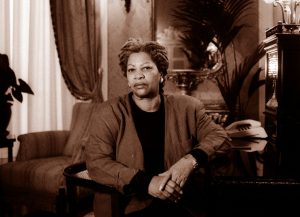
In recognition of Pulitzer and Nobel Prize-winning author Toni Morrison, who was a keynote speaker here at the University of Baltimore in 2011, the RLB LIbrary would like to highlight a few of the 11 novels, nine non-fiction works, and five children’s books she wrote in her lifetime. Look for these and others in the Library. (You can also borrow through inter-library loan.)
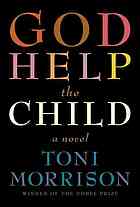 “A tale about the way the sufferings of childhood can shape, and misshape, the life of the adult. At the center: a young woman who calls herself Bride, whose stunning blue-black skin is only one element of her beauty, her boldness and confidence, her success in life, but which caused her light-skinned mother to deny her even the simplest forms of love. There is Booker, the man Bride loves, and loses to anger. Rain, the mysterious white child with whom she crosses paths. And finally, Bride’s mother herself, Sweetness, who takes a lifetime to come to understand that ‘what you do to children matters. And they might never forget.’ “
“A tale about the way the sufferings of childhood can shape, and misshape, the life of the adult. At the center: a young woman who calls herself Bride, whose stunning blue-black skin is only one element of her beauty, her boldness and confidence, her success in life, but which caused her light-skinned mother to deny her even the simplest forms of love. There is Booker, the man Bride loves, and loses to anger. Rain, the mysterious white child with whom she crosses paths. And finally, Bride’s mother herself, Sweetness, who takes a lifetime to come to understand that ‘what you do to children matters. And they might never forget.’ “
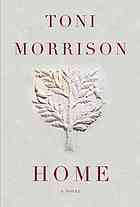 “This book tells the story of a Korean war veteran on a quest to save his younger sister. Frank Money is an angry, broken veteran of the Korean War who, after traumatic experiences on the front lines, finds himself back in racist America with more than just physical scars. He is shocked out of his crippling apathy by the need to rescue his medically abused younger sister and take her back to the small Georgia town they come from that he’s hated all his life.”
“This book tells the story of a Korean war veteran on a quest to save his younger sister. Frank Money is an angry, broken veteran of the Korean War who, after traumatic experiences on the front lines, finds himself back in racist America with more than just physical scars. He is shocked out of his crippling apathy by the need to rescue his medically abused younger sister and take her back to the small Georgia town they come from that he’s hated all his life.”
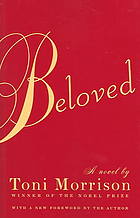 “Set after the American Civil War (1861-1865), the novel is inspired by the story of an African American slave, Margaret Garner, who escaped slavery in Kentucky late January 1856 by fleeing to Ohio, a free state. In the novel, the protagonist Sethe is also a slave who escapes slavery, running to Cincinnati, Ohio. After twenty-eight days of freedom, a posse arrives to retrieve her and her children under the Fugitive Slave Act of 1850, which gave slave owners the right to pursue slaves across state borders. Sethe kills her two-year-old daughter rather than allow her to be recaptured and taken back to Sweet Home, the Kentucky plantation from which Sethe recently fled. A woman presumed to be her daughter, called Beloved, returns years later to haunt Sethe’s home at 124 Bluestone Road, Cincinnati, Ohio.”
“Set after the American Civil War (1861-1865), the novel is inspired by the story of an African American slave, Margaret Garner, who escaped slavery in Kentucky late January 1856 by fleeing to Ohio, a free state. In the novel, the protagonist Sethe is also a slave who escapes slavery, running to Cincinnati, Ohio. After twenty-eight days of freedom, a posse arrives to retrieve her and her children under the Fugitive Slave Act of 1850, which gave slave owners the right to pursue slaves across state borders. Sethe kills her two-year-old daughter rather than allow her to be recaptured and taken back to Sweet Home, the Kentucky plantation from which Sethe recently fled. A woman presumed to be her daughter, called Beloved, returns years later to haunt Sethe’s home at 124 Bluestone Road, Cincinnati, Ohio.”
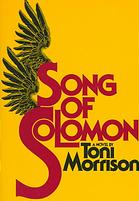 “Milkman Dead was born shortly after a neighborhood eccentric hurled himself off a rooftop in a vain attempt at flight. For the rest of his life he, too, will be trying to fly. With this brilliantly imagined novel, Toni Morrison transfigures the coming-of-age story as audaciously as Saul Bellow or Gabriel García Márquez. As she follows Milkman from his rustbelt city to the place of his family’s origins, Morrison introduces an entire cast of strivers and seeresses, liars and assassins, the inhabitants of a fully realized black world.”
“Milkman Dead was born shortly after a neighborhood eccentric hurled himself off a rooftop in a vain attempt at flight. For the rest of his life he, too, will be trying to fly. With this brilliantly imagined novel, Toni Morrison transfigures the coming-of-age story as audaciously as Saul Bellow or Gabriel García Márquez. As she follows Milkman from his rustbelt city to the place of his family’s origins, Morrison introduces an entire cast of strivers and seeresses, liars and assassins, the inhabitants of a fully realized black world.”
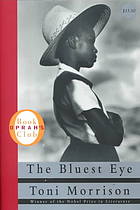 “It is the story of eleven-year-old Pecola Breedlove — a black girl in an America whose love for its blond, blue-eyed children can devastate all others — who prays for her eyes to turn blue: so that she will be beautiful, so that people will look at her, so that her world will be different. This is the story of the nightmare at the heart of her yearning, and the tragedy of its fulfillment.”
“It is the story of eleven-year-old Pecola Breedlove — a black girl in an America whose love for its blond, blue-eyed children can devastate all others — who prays for her eyes to turn blue: so that she will be beautiful, so that people will look at her, so that her world will be different. This is the story of the nightmare at the heart of her yearning, and the tragedy of its fulfillment.”
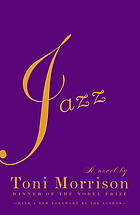 “In the winter of 1926, when everybody everywhere sees nothing but good things ahead, Joe Trace, middle-aged door-to-door salesman of Cleopatra beauty products, shoots his teenage lover to death. At the funeral, Joe’s wife, Violet, attacks the girl’s corpse. This passionate, profound story of love and obsession brings us back and forth in time, as a narrative is assembled from the emotions, hopes, fears, and deep realities of Black urban life.”
“In the winter of 1926, when everybody everywhere sees nothing but good things ahead, Joe Trace, middle-aged door-to-door salesman of Cleopatra beauty products, shoots his teenage lover to death. At the funeral, Joe’s wife, Violet, attacks the girl’s corpse. This passionate, profound story of love and obsession brings us back and forth in time, as a narrative is assembled from the emotions, hopes, fears, and deep realities of Black urban life.”
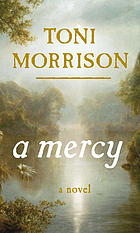 “In exchange for a bad debt, an Anglo-Dutch trader takes on Florens, a young slave girl, who feels abandoned by her slave mother and who searches for love–first from an older servant woman at her master’s new home, and then from a handsome free blacksmith.”
“In exchange for a bad debt, an Anglo-Dutch trader takes on Florens, a young slave girl, who feels abandoned by her slave mother and who searches for love–first from an older servant woman at her master’s new home, and then from a handsome free blacksmith.”
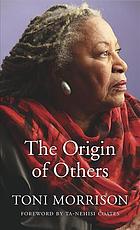 “America’s foremost novelist reflects on the themes that preoccupy her work and increasingly dominate national and world politics: race, fear, borders, the mass movement of peoples, the desire for belonging. What is race and why does it matter? What motivates the human tendency to construct Others? Why does the presence of Others make us so afraid? Drawing on her Norton Lectures, Toni Morrison takes up these and other vital questions bearing on identity in The Origin of Others. In her search for answers, the novelist considers her own memories as well as history, politics, and especially literature. Harriet Beecher Stowe, Ernest Hemingway, William Faulkner, Flannery O’Connor, and Camara Laye are among the authors she examines. Readers of Morrison’s fiction will welcome her discussions of some of her most celebrated books–Beloved, Paradise, and A Mercy. If we learn racism by example, then literature plays an important part in the history of race in America, both negatively and positively. Morrison writes about nineteenth-century literary efforts to romance slavery, contrasting them with the scientific racism of Samuel Cartwright and the banal diaries of the plantation overseer and slaveholder Thomas Thistlewood. She looks at configurations of blackness, notions of racial purity, and the ways in which literature employs skin color to reveal character or drive narrative. Expanding the scope of her concern, she also addresses globalization and the mass movement of peoples in this century. National Book Award winner Ta-Nehisi Coates provides a foreword to Morrison’s most personal work of nonfiction to date.”
“America’s foremost novelist reflects on the themes that preoccupy her work and increasingly dominate national and world politics: race, fear, borders, the mass movement of peoples, the desire for belonging. What is race and why does it matter? What motivates the human tendency to construct Others? Why does the presence of Others make us so afraid? Drawing on her Norton Lectures, Toni Morrison takes up these and other vital questions bearing on identity in The Origin of Others. In her search for answers, the novelist considers her own memories as well as history, politics, and especially literature. Harriet Beecher Stowe, Ernest Hemingway, William Faulkner, Flannery O’Connor, and Camara Laye are among the authors she examines. Readers of Morrison’s fiction will welcome her discussions of some of her most celebrated books–Beloved, Paradise, and A Mercy. If we learn racism by example, then literature plays an important part in the history of race in America, both negatively and positively. Morrison writes about nineteenth-century literary efforts to romance slavery, contrasting them with the scientific racism of Samuel Cartwright and the banal diaries of the plantation overseer and slaveholder Thomas Thistlewood. She looks at configurations of blackness, notions of racial purity, and the ways in which literature employs skin color to reveal character or drive narrative. Expanding the scope of her concern, she also addresses globalization and the mass movement of peoples in this century. National Book Award winner Ta-Nehisi Coates provides a foreword to Morrison’s most personal work of nonfiction to date.”
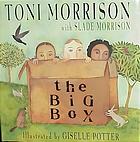 “Because they do not abide by the rules written by the adults around them, three children are judged unable to handle their freedom and forced to live in a box with three locks on the door.” [Co-authored with her late son Slade.]
“Because they do not abide by the rules written by the adults around them, three children are judged unable to handle their freedom and forced to live in a box with three locks on the door.” [Co-authored with her late son Slade.]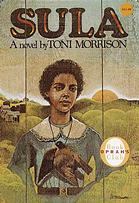 “Two girls who grow up to become women. Two friends who become something worse than enemies. In this novel, Toni Morrison tells the story of Nel Wright and Sula Peace, who meet as children in the small town of Medallion, Ohio. Their devotion is fierce enough to withstand bullies and the burden of a dreadful secret. It endures even after Nel has grown up to be a pillar of the black community and Sula has become a pariah. But their friendship ends in an unforgivable betrayal–or does it end?”–From publisher description.
“Two girls who grow up to become women. Two friends who become something worse than enemies. In this novel, Toni Morrison tells the story of Nel Wright and Sula Peace, who meet as children in the small town of Medallion, Ohio. Their devotion is fierce enough to withstand bullies and the burden of a dreadful secret. It endures even after Nel has grown up to be a pillar of the black community and Sula has become a pariah. But their friendship ends in an unforgivable betrayal–or does it end?”–From publisher description.
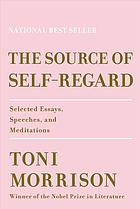 “As the last book published before her death, this nonfiction collection is a stunning culmination of some of Morrison’s most powerful speeches and essays. From a James Baldwin eulogy to her thoughts on Martin Luther King Jr., the works offer her reflections on wealth, female empowerment, Black literature, and her passion for writing.”
“As the last book published before her death, this nonfiction collection is a stunning culmination of some of Morrison’s most powerful speeches and essays. From a James Baldwin eulogy to her thoughts on Martin Luther King Jr., the works offer her reflections on wealth, female empowerment, Black literature, and her passion for writing.”